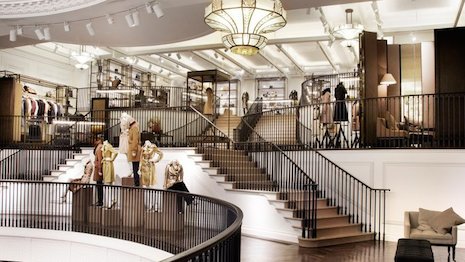By Natalie Yiasoumi
The future of Britain remains highly uncertain as U.K. Prime Minister Theresa May’s withdrawal deal from the European Union has been shot down by Parliament multiple times and an extension of the country's exit remains under negotiation.
But while Ms. May and the European Union debate whether the exit will be postponed until June 30 for a longer 12-month period, or whether Britain will crash out later this week with no deal, British companies across the board are bracing for the worst and making contingency plans to be prepared for a hard Brexit.
Real impact for the industry
The luxury fashion and retail industries, which rely heavily on imports and exports from Europe and also on the recruitment of talent from across the continent, are among the sectors that have been hit the hardest by the unstable political situation.
According to Walpole, the sector body for Britain’s luxury industry, a no-deal Brexit could cost Britain’s luxury goods industry up to 6.8 billion pounds per year.
U.K. luxury exports to both the European Union and to Asia-Pacific would be dramatically reduced due to “detrimental changes to market access,” said Walpole, citing delays at borders, higher tariffs and additional compliance costs, as some of the issues that would take a bit out of export gains.
London designers, who have always been celebrated for their niche, experimental take on fashion and mostly operate small-scale businesses, have already been feeling the detrimental effects of the looming Brexit, with the weakened pound increasing their production costs in Europe.
This is particularly dangerous for smaller businesses, which already have limited cash flow and have long been struggling to keep up with the demands of the fast-paced fashion calendar and retail deliveries.
“With an industry that is predominantly small- and medium-size enterprises, we would struggle to cope with the trade realities that a no-deal Brexit would bring,” the British Fashion Council said in a statement, also urging the government to back a second public vote on the final Brexit deal.
Burberry takes a hit
But even Britain’s luxury behemoth, Burberry, has been open about the dangerous implication of a no-deal or hard Brexit.
The company reported a small dip in third-quarter retail sales to 711 million pounds and said that if the government does not iron out a trade deal with the E.U., this would incur “operational complexities for the supply chain” and additional import duties on "the low tens of millions of pounds" every year.
“We still remain hopeful that Britain will have the closest possible relationship with the E.U. after Brexit,” said Julie Brown, Burberry’s chief operating and financial officer.
“A no-deal would be bad news for Burberry, but we would manage, and we continue to model for different Brexit scenarios,” she added, pointing to a series of “mitigation actions” like allocating more inventory in other markets.
Brexit-proofing
Stockpiling and setting up new manufacturing businesses in Europe have been growing trends amongst luxury brands across apparel and beauty, looking to dodge post-Brexit tariffs.
Designer Katherine Hamnett has said that she “Brexit-proofed” her brand by setting up a production, logistics and distribution hub in Treviso, Italy, as did cosmetics retailer Lush and The Hut Group, a British tech company focused on beauty and wellbeing.
In this case, Britain’s loss could be Europe’s gain.
There is also another opportunity to consider in this unstable climate: For international brands, the weakened pound and reduced rent costs could offer an incentive to enter the U.K. retail market.
Despite the Brexit dilemma which has naturally weakened consumer confidence and retail footfalls this year, luxury brands still unanimously value the London market as a key international hub that draws Asian, Middle Eastern, Russian and U.S. luxury customers with big spending power.
So no matter what happens with Brexit, big luxury players will want to keep their presence in London.
Case in point: Bond Street, London’s main luxury shopping thoroughfare, has been bursting with new openings and store refurbishments, despite the chaotic political situation unfolding in Westminster.
Cartier has debuted a new store concept in January. Down the road, Stella McCartney and Givenchy opened their new boutiques. Japanese jeweler Tasaki picked Bond Street for the company’s first European location, while Dior and Louis Vuitton are also planning major store refurbishments on the street.
Similarly in Kensington, there are plans for two new luxury hotel openings on Sloane Street, as well as new stores by the likes of Balenciaga, Fendi, Versace and Armani.
“Short-term we have no idea what’s going to happen, but in the long term I feel comfortable that this will remain an interesting worldwide capital that Cartier will be a part of,” said Cartier managing director Laurent Feniou, adding that the company continues to invest in the British capital and plans refurbishments of its Selfridges space, as well as an array of events and a high jewelry presentation.
Natalie Yiasoumi is a journalist and editor specializing in luxury fashion, fine jewelry, business strategy and online retail. She has written for a wide range of B2B platforms and consumer publications in the London and Middle Eastern markets. Biggest areas of interest include the intersection of fashion and technology and new media frontiers.
Reproduced with permission from Luxury Society, a division of Digital Luxury Group. Adapted for clarity and style.
{"ct":"Z+MRxq0Vgsc8V96K00kG63EwTIGLmTj+wmb\/BOKkMEBbTok6gvnz9TfMd\/MTGNBqD8PlfPV3tfUMUCtQurN4Ii6swK7QhY2rai8okvs84I6BQjrkknP+b0ogBxK8m4VfwJMrhbAN\/DkvmCnQRcoV5dMyu+pAWxhVbBbdlDeiwhJCTyysANNVEF\/Id\/SPhlEiMT9KnZg0rwiRJxf96+xh5alZX0txH3ayfqjMzrd9o\/R598geEY5H5htoLHWQfNRnEPnTB0jHGYfmHPb0uabeHXt7uxQ37e3sQR045XjfcQpG3OfuVdT5GOauxSzgeZd559ZSrAM5uPTiqAgX3DjOc+2rulaUl\/da+AbGsCb5wh6RrscyMbs7gHdFMsa5+opf\/7o34hNkuguuoIb5HhHZiKkB9UFGWTACaVdCqoz5Utt+bRYqmFHwNAsWwPQ4yjGPcToK4yUQXHBG9NVIySHhwTDoaG8BXxbaJEc81DqMh3qwG5DyU0h7LgChdAEaxhJlo3XK3aG3MfGSgYh9lkuJ9fz+YlRZaPgMxFHCA8RAwqr5aM3589icptZWbOcNDyRbF0VzBrpOXCUEIh\/4c8sm95I+jymdKEbGsCRx0mnBKnF3cMUYS5kMHe8YEpN5\/aD9Lg5ukug0qN4GJeqxXxe3cBq8cOmdMsM0tgSOm3FURGYBrRNhLCei4NdySfCa1s3L2IOP9nYHGmP\/tWyHwUPs37lZxg8amOYkhSLrgfoIUQjR2W8uIF3uo9buexmqGl1AT2w1djE9vYZ2FBOF4A2ibOTZ3e0RKbctngj+N1yy2MM\/NtHhUCbpsg3amznnfOFuMQFdqliysGuz41fqCJp7mzjcvD5H7aGD75BNS+EtEpc5UpKxLSeAugxg\/Bg9e4LONHGzgohBkX259xtzn5RmKS9HUq4470AiTzg14xziyxEmG+RJnpOFLeaknW1TiUGFq9B3i4uhhhX6WDTkHBsyARKV1ehazpXJ8x50w5vFKp6TT\/3vZPC4+UXhXWOp+3mSfePS8NbuNnnHiOq4N4Lq3HQ2nGshVD+i\/TSHPuB0QQkjWAuB+PLh8BxoR8l6HDnRNYOv6iavMVUSxNcPDVjDdMX3expTxtLwtyyhtu22RvT6qktewx88bHTpc6zcDViqd9S9ST9drHIkzh1g+Drkt\/QcvdtO6b2y91yNdK2r6wAOCxEuiwXEfG\/NyVs3oJjp4x9c35EiCSLCFbGCwqpirvjtOEnbIFJOQ\/u0oIUSdfLSQ+OPSvrq\/xnt4DiOybarzX8qS24Iqj2\/BfGQNPfYpunK+U1iEkWz3lWtVdmqR3WVA4u7XbUwK8OIiY+Crf\/MQKLH8qgghOkbp1G1G4qnGSUh8XXYYxYcESfaAMQQFsan2UkzDIWrGeohjkoQzN2HvWjmES68jEnJqD\/ewxhOkxwwUq8zP3K85bKc0ksbQ2OXv2VB00kSD1KMZiMVtqRa9lDDtoAkOCKwbLmZhE1LQcShIWhh0HQrLClWbCfX95\/scA5zADLCHRaYnO7Ex4fALDAbYIZF1Gzuqva03GnNHD3VnuU5+QR7rM2gZGA7UcFI9DDUtHM1olXLGb7LQY64leW3NmLhw1XTtEWGuaDHtooBcOOj8ZGyNhM+OB6F4dtfV1OZPMZz3HdMI+fP6LxKiDUYKIqsYyqPGLHmMlEPKL8mnLBILhYT2zFj97C9+JgWAdhcqcosa5LHlBDrOEci691hO4UmNlJ5uuFdlGtdCs7\/PKA+t+u+VyLk\/68tt2Po1Nv5+JY1qq6jGX\/56JgEQdzp1QoW\/+cf\/E8llg27m+QcWP\/YJId4YFcqSKrTnKXaEiwNgdrLZzcwi82KdNW0RoJLTNJjtMbUD5hY2cn9xpH5jzEhpnlvp\/cKvZoIlwWk99KU+CFEdIOr03jb9qlV4W11enIICdadIKTC\/l86QIn7FZh6BFoUUqk6vxfj0URP3Zfge+FP0Q966wmDvZ9NfjJmxgrv4JlRWrEyGyI49\/qsMogsm9xIm4LdVQXyuRR7RdQH6dXFc9NJEKDwvpphgjC6rSFzVw5q5nIhUXPj4VjXebV9vyZxzxrkSJ3pKd55cHqOSU6pqkdvTgP\/3oTWfag\/5UAUJvwDrjBWfATtwy5+9rtCAZn+aAXFwHVMPTbwPg2QOaOvHTiitzm7cW1l9R+rLvewxMNoZzhGVnS\/EgZ6G+wsv6tNx9aJ08kIQ7UR4\/X+ISpb6sSHvLuQSloXEwtm2svRkaLP1swuCHfmijv4lSSwy2TIR70mHFFj8lWrgBmJQhM860fDjE4zhSg4+gVGBuA4CELn6FdWlTHDJVUwTQOIgid7r0FARUXAExiVR4zTYPLKpU\/c7YBdDuOwON8z3HxWcgP3bLu9+w5Fh7MT\/R6CsGAjPJgU3ivVGDSdMV\/4Jh9lmnYrX7RFE9zBCtzT\/6MmAAnqeKnYKh6k1H1Dp3NA4\/jcQegsFSJ6UGmwnmRSaIg7JX2a9bh+uq\/wVJ4X9DkuDAM0YWVeWiWZzwa1AwPPeBWqzArKxSI+4yCWiES1VCGz260OHUmCQvVit7dSDmctFEoWkzzkfbkIWZyROpSBm8IZeL+w65D6T0kY+MxUxRtn3kA3N8Dckc\/hTzean0G44\/GIZlmA2cTg5T03HH14+1NB7nPzVzW5RSLsO7iuMLVjhC6IIiZaw+G3xwvN5dNU0Pcjcw8cdb\/ZuTDn3jDM0ZAKqB3wTrtHlXkL1jlXwtvXnAvXD8r7bNCUs5\/Y+2JlCR9aZyVtfavodJiNvryKunoAbYk50TGLabszQevkTpgkPXCfYqN2L2Lpo+ao2RfNi34GM7GlWyB45vkP2FN1XStkk3PgWG1pnfC8UYbU3amzBxtceaRbT7cZGLkbJiRODQDrLPV8hgSFprn29fSMTtzgkwLWzUZrfy8O3FikYP2mcHqFQ2VlhPe2Dh3gfKOKTbRxDtOtfUy7PaXasyK5Br3Xjo61\/Lw+wnQsZ7RX9el+zr4Rea5lhz\/PasJZ1RQCNor6h96GiN3SyVpCJAnlZz5Cu39kOp11YUsAURwUr+k08LmfbLl6BCNZanyD+GOyKn8sMzS6z7Stl5DrlqCUwQJqHOpQoOfehBs2zPghS34OTTygW6hoGoBxbGJwFyGLd2UtS0A7YeE1iawlduVoyzOcJejtOKsUkiM0lioP0kWVZy8P+KPQJbHJ19OnGho6STVzkHvVrDIjLqFJD7haOfAa2xktKPbp7YamID1xa6KJzd9fTzEv9L6dsLawdx\/vMPhqKf5oe6TeWGvEuP1zWgBvSps6Q2jIHHdGjIj2K4ZmYjQyAOOxzv63RCN5GyCiDKr2oFaxRi47iamKosmep6FfGLkmKDWyQNP9sei1ULHFsjxx+I1Y5\/EebhV4DVTdzw+MqWAxf6GKNJvAYUiIrKJG9Iab8VK17j6PkeAMzMaKe1\/XSdp4HaW6GGdaBB4EJJg\/XwhtJbxBDmNIk4lzQpvGA04z\/pEX93A83K9xVhmiJclBvkl\/Qsmk2PyQJfV1GZBEz6bD1B5n8DEJQC2848x6TZoI6Wp9Mbdrv97fWu6l1ulo1gmyd2L4j4aAR+Gi4K17jhoLsvTsathMIWDoZlIYrywQnUgGUx5OwqX1iVdpLmfO7lt5JUaIzKhHSNUQwW3VoKlME5WxmItUAozSSLEQxruXgU5O6gfqikS06dmn7GOa5x7ebhk6Gj7MwlyxxjNU4Jn2nke7tlF2NrRjTX4IFVIQsgFJHpJa79AUWOZ4yMy42p1q91IX6OKQsighBMYpd3VxZ3gmn\/ENk8WgxeXVnFGFt0hdhBddS+LML9I+E05TYabtBnIl7TmUi3RbRQamQYTl59+VEDYb1p0nqsUqBT0XQUOUVjrjL1I6yMzT7IEC6Gyw7fcQB1JgSqA1chjn4wV4r3tllzr0H+8xl1N9VFnzcbcequDmrvKeuJP1irJowDB02PD8cFC9JTYgzejBQu\/DWrK1fLcOhT66oWZwMdkVwMvR\/EDvA8D6Z9BosGxBrieC9P5PnY1XBJVDRVJQvyku5QxUs1OnzhFOxAH5TDodRgVSiOV7lUMYEB+lSf77PbI8Oa7DqUVYNJFOphm0Csnup3WzwOsK1vPWHVLwAVh1zN7duwj100lrh+NalC5RZcRlxEtmcwumtyEsyI0SYA4xu4+G0czjCcydQBjwqJn4mrQJUHbiT+B4Z0YVaPR8GZxxU0A7sbNdoDnyU1WR+O\/KbbpbTp\/VqL+3cqIi8c7xEaMt6ubaiODUe68Y6linUWCbVzsY+f2QGdtEtZ3Kx+cc95L+thuBvkmqjNOGvCCEI55aLe3R28PzbvKl91FFr+\/xQ8Dstv7wt2TwNbJAdAgWZV6aopoVv2i\/5bjzjxMT4oLOGuNBPD+mvXtPu58aoOL7fa4wSRIuyNRvpwn\/UJR3ADcnwQB6VjMxsQ8Zn8bz01uZtXeZom931mj9kMD0nhpgjjpZDIHL\/zH5Q8Dqx7IE2KcCoUooZTZtIva9oiS1xh+6guwvYlhiON\/9nImK0iiVsSHA6o0kcKz3x\/FkQetNsKYEPyMFJlRXfmkq1z\/fOAa0HmzGqHmJtcODymMdlbrtEyyUPqqUxE9W0jE4ery43ErNeRSAXRAw0Im9pcj0bbX1t4oGRCJIY0e+4NLGMFbw0HPkbkAs8ZmKmR8Iizt+K7ftOkAwUlRxeyHmiGaJkAh1uOY9eIfPOeVom3CKZOs1poRA+xqmGYalQ3gbQUVucdq2PvlKZXcIM21KIJO1OoBd1wdgTEQRFoWxnMKWwlUgBWrboqfZCU2Mmq3dD3Yu6FEu6lVhwr1sDP3Q9bRU9YSLkTQounSz3pBTt8LNP7pMZ8+pzf06+Vd2jGrYoBN86H7+Ay55bl8WTMnCz5f64+BBPKtQ58hnwArJktALWcuptcZEdLMasLNLa1nF+JwppxgxfZOPhZyC\/STyqhRcQgj\/Xfu0uUKsFWYszM7ZlaSTLyt1OX9\/yc2vTnxztarfjOUrIrhSzxqpTkbsqBqeHww1WMVJZq5v4Pn5GhqMmlziawcwKUx0evFvaTqOLieUWRbLqq+xmM4y3ynTTExYCqSGbnOVN96LVL87910eRdj6ZHqiToUcfGo9wct\/O5GxqNqq4ieUSaeD7qF\/eKvduLtBr2lsvHopPf926DEVVpfonWH4vzuXhZIcfBv\/Qm85jOkY89YbyuXkPGKcfb8EWX5s\/rpvrmlazchk3YUGd9ZkNP7+jvGb8i1nTQF+Ztrj9w5bIOltlP0VeJlkWFmXJkGC+T0AuoVFew7kSt5Vvg7xg8Bk97SSsNcR8lF83iUE6tq9oFj5IvUxPeZtkibPM1pnQO7ZqD65+vJig9WWEwrRMAcurCZ92evhluD1\/wEldfkh8Y38kWieYmSIwOyln4+4HTrrB\/8Fy8Kk7VDGMBP3nUKmrW2LZcZSltEQ4cJAI65esrtFkU1ipdFAOeyMsXT2Wkq9858vRnPxTo3xsv2nsnchQ9DR5lUh0xEPiEonYrIy7xZvtA54GsNbLNJbZdfBpvHSCiZ7lg16j8nhYciqUfNxy3D8Qx+gr\/hJW1ePtNof9cBlSBvcDnepDiMMVbjzZx2tsG6UYLPai+J\/WEKsRVmwgzDU1c7j6\/yld4TmobhZBpw5TvgTJsnRzIPzMM5pdewD+BFhluhNW5MvnGCqyha3IVChppyNh5i5uef\/dGvYr\/RSofCoBjBKVhWa715voih3BPz1xFPhhvPqgo4AjIN2ZvuvUiRfYbwPBdXr8ctFV1KdRwpo4Zp0J+5x\/dHPevF1BWLVKiA0kHC0ZTcgnkCBp9OFY0e+uEy6ift\/qGARIqUGJRDsKWIJ8IpoMF2pFpLafrLMmORTjuqcTGT\/Q03RHhSSP\/k2LszexEmbJgNNPZcVgNiQ7YRtdaadey90KN\/3TdOsEgWDJm+XtYr3FlUnMPl0FigfjaaYSCs5FW6JUhXnrYzkXI8X0F7HqCZAdEop4Q5q+NViUYPhT7Nj6ePP6KlwRSfuzMRYNaprVS7ZVmdeC31dnaDm9WMQFqSrWpVRRKnpzSLhHnL9Ca2S0cJ1Oa+srffk+z1PtvUrUr2tuEUapI7nurq05Ah4gG+noyAi\/xhq0r8tl6hBFhPZy7qxyCb14xxLxqnR1Rldi5vstEbe8Sg+8TkDz7q+gM62PsVJlGOEZQn44bipG6\/lPounJIUL3amRi08tcCB2\/rc\/sRevuV+PdfTQJ1zsv+SQfexFrnLafbkHGB8gIQ7Dm\/5cMBjFQWyPgMePE1cjjPuDstjYQ6VH6jI2e8uZCZ\/8l6T7V9NsfIsn4Z4+WFXGwNOI+aqP1E9tI5uM3G73HjTIOaj9BvGgDMPT\/BUt6kUkwf5qz9BHnOLdCLV+t+CCjvs3dKuIDeJAtj\/o2Hw4AO0\/gewCn3tc+WuLGMAuQH4znNHLrmfMX4tXeEvKJUSgjqcDkxDeKkR0cxg+\/2nD6BHpodDtR2NHjrTuJUDKPf5Aqt5\/AmSW7QF4IN5gwLh5pfLyz1G+Hyh55V0oRPZOZEO28ir9GubxPWCiV2nAGSDZHVLwJi2ZB5TuvnHuV7qLhx6VKTYhVXT1ADpIcrz7fM3zOtaKTAM6n398h02zqObooJHCi+Ugu1u\/jIX2B6nXvHPSLsD\/2Y9tveXeYA7GWsJFYDGgsIHIhmDTWPwRQY6o7D22tfdUaMAMF0m0PgH4qMT9d6RcIS4MZMlNO\/ZUlF46IXeKOnC\/CffDIhNQ7FBhqG90uq42daKr5skBtv5\/AuddevuAYxHzaERkyZ86CKe13d1sUmMnr0abfWhq3TzFOVoF1883oJdH+VNqZ+Zv+8oCZyasKH9cwUy893Os0e0VQo7WWUspXr46KW1ZKErGLVg02eMRDdFsNmwJ32tgMRpCmog1WTR\/FyvOKPAtDLxCKy6RQ3pSIDNKK6ciJHHVwjVTZJADtdj2OERBYctaoEnu+4Zxegdck74ixhivNI78XGcR4QTy6H9\/9N0k3cxDF5A6Hk6o0cxvxObCPVK6q\/\/565Jr16XBKS10ZJZKH2ZMGIqUKH8m+JLbKj6j+IYYmYMi91VKYuHH3R3kyYbTbl9U63BGkPRZmdIKQQwvGJ410kx6NA\/fpLO3zGO02Kxlo5uExQo+K8RRLO30e1J+1VZn6qvDCsXtw\/e\/6jn1lq2eA+sjOkteyG1238I\/js5vMtOq2O7gi4TQ2sNSbjtEVQj4YieJFiMkQPQBKLg3TAaqzs8XKF1sI3xkQGztiQuDCL5\/8QlhL9Kz7q2I8GZj9xc5DUT5XhZV5DwGKYh0Y4MejVSmDyubIiJUNs5XkHW50CUhQySWSASnX51YNp84W\/coP8eF3CWjBKfMHWJsR6GyNMu3S97GFhswjW8mzHkYiTnr+r6S22X7ZQVmcPPoCSB4kFzAYq93sVASflcWp1sEbxq16Mt6FboL+PEiAFYLlLjNL6wlRkgp8gkbHhCwQ3n30M+o8orAclI1Gst6GAL6XHXzNac2kHwfKfEOvCb8vVB\/gZ1ro1NuHtU2pIyvbZzFx1XO5JOJAHP9Aqm5l0jNG21k5\/vLceDUd9UnIARweHOCU31iwUYI\/zbJlv8TBJFvTYFNoSnoaAblQ0liuVvtvCBDKIlcCho\/9Z3giUs0z6kLwxq+qmFDCXD24qMm9+S8pSe5iRBqpF3KW3HNxPPnKT8xbUEp9pqu8+r\/pwngWUVSToUxC8Tn0PcShr8gDBcnyBJH4fZm7Xm5H77IfbShzc7l7JAVVnZaEExrsMaQaSc7nq3jca2zk7StbnGIOgXF31QFpLAy51kh2CAJzDJhTaPl4wewJ2YRq54UMbkt\/yiIbma2jxPZbldERqpbpe2ydDQsmpbn41OODWSrfHKJ8SAGelvx1bZpVE3GSA+3ybZSVNt6MrFYOoySPzwnMLeAkAJkq4jvZfSW6gVJRpy7a\/gXOyhgod\/MNvuxd85DfmWchH7RVm2oRvmUNNsVZB0bRtHs+jgku\/UwrkKW6SYQik64I8UGfvw2+8Yn+g3vdpB3fbNCrBc0\/HFRGrW3kDWNXn4y7aAdAsRUynmGQncLwTBZlHNiyUDdj1ROGlTtVGqE95knw21jk0QVOMKjnskeFR2CN4FEDYzA79Yqx7THA+bcmwySMy3kQ+nv9B0mEnUB43wCmuq\/yAa\/nwtLiKP5dH6iEzSmPlwxT11Yazpw+8rhIgSkMHZWBBVB\/h5fZaY10kIlMh7vZ6CV\/igvQva8rxvRSZMR0+V7q1zdhRDTMystbU3l+AFmjdnmArWnSSn6q4wBbfTP\/bASSA+IsRo0GNlEqcYPd3zbcrlB1hWjRgfLVOWVJ0VE7aqK2E+vnEplzQRlKBa9YQaQ1NyvmGlUsDGzSm\/aJSEaLT4tetUcg6LMEYBEQ\/PDNA7CaRJOTS9nQ+\/67GV7pAfdXEEwz2prKIN8HHW9b+96lrSXqiX92sz2l7pKCp4vOnbPIKmZ7IEiXJC0lvrB9+JPh1\/cHgMsRQn3ltMJ+9V2MCf\/ka\/6vHuu6JK8OJo\/KDytiZ6G+QrETUeoOSL65eFm2EmZwUcIAqfJzqagDQR+HMSv+fGgYHIyR69XwexRpPAV6ver29klGBdvS3nPUUbsxjQ4EJxQi14LGq2t+sFsWHSHieawcZvc\/lSIXMDBxqDl4UetiUstAt+rcXX\/pd\/\/1fH43ACQ4Y6uCgaXL5ni4ZsbR8p9I6ePUBkD05xKYQpFwzY6D7EXknEbU4ApA1CxQw\/kwGk+","iv":"9a49789addad07faa0ca99e94ad23f19","s":"cbf3d09a7bdec96d"}

 Burberry's swank London store that attracts visitors from around the world. Image credit: Burberry
Burberry's swank London store that attracts visitors from around the world. Image credit: Burberry